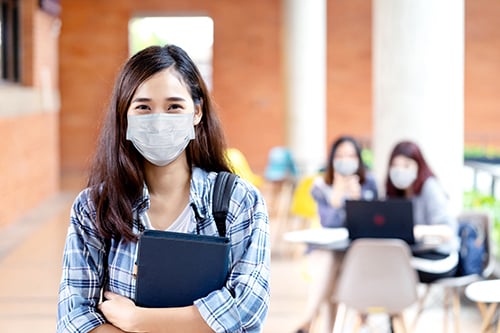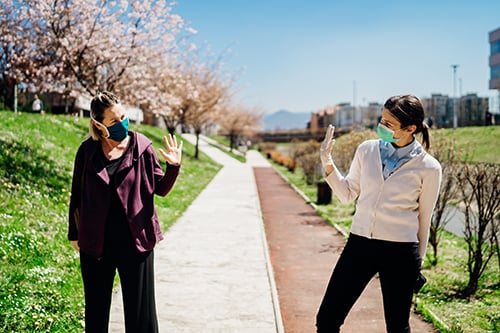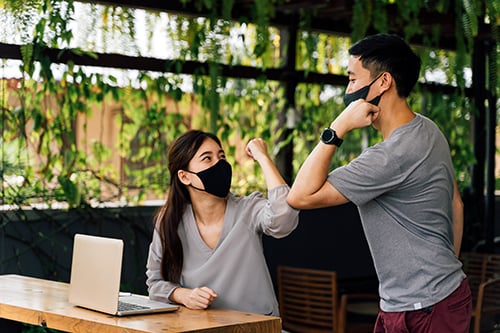With the onset of the pandemic, it has been a whirlwind journey for the education sector. A sector that has been solely dependent on face-to-face interactions and classroom teaching has found itself in a dilemma.
Institutions have been forced to adapt and change their entire styles of teaching overnight owing to safety concerns for students and professors alike. This has brought about a whole new revolution in the manner in which education is delivered and received.
Positive impact:
Having said that, we all realise and know that there’s a certain type of assurance in a face-to-face interaction when it comes to education.
Vaccinations are the salvation at the end of the tunnel!
India began the administration of the COVID-19 vaccines on 16th January 2021. As of mid-May 2021, India has administered over vaccines to 4.5 crore people already*, including first and second doses of the currently approved vaccines.
Currently, there are three approved vaccines in India – Covisheild, Covaxin & Sputnik V. These are open to everyone above the age of 18. As per experts at BofA Securities, SII's capacity would rise to 100 million vaccinations per month starting in July, with Bharat Biotech's Covaxin capacity doubling and a major 200 million doses of Sputnik V imported. The brokerage firm forecasts 34%, 40% and 48% of India’s population getting vaccinated by 2021 in bear, middle and bull scenarios respectively. **
Experts across the globe believe that the sooner nations vaccinate a large portion of their population, the sooner things can start getting back to some semblance of normalcy. According to Dr Devi Shetty, in an exclusive interview to India Today TV, he said, “The country needs to vaccinate just 51 crore people and this can be done in 2-3 months.” This means the faster people are vaccinated the sooner we can overcome the COVID wave and get back to our day-to-day lives.
The education industry is no different. Here’s how vaccinations will have a positive impact on the education industry:
1. Vaccinations will protect you
Once a major chunk of the population is vaccinated the country will be able to reach herd immunity. This will allow us to resume day to day activities and slowly and surely get back to our lives. While it is true that you could still get COVID-19 even after being vaccinated, as per the government of India website – “Antibodies against viral components, such as spike protein, are produced by the body in response to vaccination. Therefore, all vaccines are expected to provide a reasonable amount of protection against the mutated virus also. According to the prevailing data, the identified mutations are unlikely to make the vaccination ineffective.”
2. Freedom of movement
 This includes commuting in public transport systems, being in classroom spaces with other vaccinated people, being able to hold events in colleges without the fear of COVID-19 looming over you. This means you will be able to attend normal classes and resume day to day activities within educational campuses.
This includes commuting in public transport systems, being in classroom spaces with other vaccinated people, being able to hold events in colleges without the fear of COVID-19 looming over you. This means you will be able to attend normal classes and resume day to day activities within educational campuses.
3. Positivity & human interaction
 After what would seem like a lifetime, people would be able to interact with one another a little more freely. This would mean that classrooms would be buzzing with activities. People from all walks of life would be able to come as guest lecturers to help impart their knowledge. In turn, students would find it a more simulating and positive experience to be able to interact with teachers, professors, their peers and other people of relevance. One of our basic need as humans is interaction with a fellow person so we can see their expressions, read their body language and more. It makes us feel that we belong. All of this would be made much easier by the vaccination.
After what would seem like a lifetime, people would be able to interact with one another a little more freely. This would mean that classrooms would be buzzing with activities. People from all walks of life would be able to come as guest lecturers to help impart their knowledge. In turn, students would find it a more simulating and positive experience to be able to interact with teachers, professors, their peers and other people of relevance. One of our basic need as humans is interaction with a fellow person so we can see their expressions, read their body language and more. It makes us feel that we belong. All of this would be made much easier by the vaccination.
4. Safety for all
 People are now sceptical to touch inanimate objects let alone come in physical contact with another person. Shaking hands has become such a social taboo. But imagine a world in which vaccinated individuals roam freely and can be around each other without feeling uneasy. This puts everyone’s minds at ease. Right from teachers, professors, students, staff and their families all can feel safe and secure. This means that the education system starts functioning seamlessly as before. Lectures, hanging out in the cafeteria, attending functions and events, visiting sites, and working on projects together all become a real possibility.
People are now sceptical to touch inanimate objects let alone come in physical contact with another person. Shaking hands has become such a social taboo. But imagine a world in which vaccinated individuals roam freely and can be around each other without feeling uneasy. This puts everyone’s minds at ease. Right from teachers, professors, students, staff and their families all can feel safe and secure. This means that the education system starts functioning seamlessly as before. Lectures, hanging out in the cafeteria, attending functions and events, visiting sites, and working on projects together all become a real possibility.
5. Introduction of enhanced technology
 Many of us are currently relying on technology to get us by our classes and lectures, however, don’t expect the use of technology to wane with the country slowly achieving herd immunity. The education sector has seen how technology can help create a more interactive and meaningful learning experience, and it is here to stay. You will learn how to find a balance between using technology and classroom teaching to enhance your skill sets. This will benefit you in the long run as you will have that added knowledge of a tool or app.
Many of us are currently relying on technology to get us by our classes and lectures, however, don’t expect the use of technology to wane with the country slowly achieving herd immunity. The education sector has seen how technology can help create a more interactive and meaningful learning experience, and it is here to stay. You will learn how to find a balance between using technology and classroom teaching to enhance your skill sets. This will benefit you in the long run as you will have that added knowledge of a tool or app.
Educational institutions will look to include technology in their methods of teaching and even make it part of their syllabus so that students get an all-around wholesome experience. This helps them stay ahead and have an edge over their peers who were only taught by traditional teaching methods.
Someone once said it always gets worse before it gets better! And that holds extremely true for the current situation the country is in.
The education industry has done a remarkable job in adapting to the changes with ease. They have ensured that students do not feel the brunt of the pandemic on their education and careers. So, there is the hope of normalcy and it’s not very far away. When it does come and you find yourself back in school, college or university sitting around discussing the pandemic with your peers or professors, you will look back and think about how much has changed and yet remains the same.
* https://ourworldindata.org/covid-vaccinations?country=OWID_WRL
**https://www.livemint.com/news/india/bofa-securities-estimates-48-of-india-s-population-be-vaccinated-by-2021-11618837302575.html
About RICS SBE:
RICS School of Built Environment (RICS SBE), Amity University is an industry-led academic institution that delivers specialized undergraduate and postgraduate programs to students ambitious to work in real estate, construction and infrastructure sector. It also aids as a hub for research and development of technical proficiency in built environment.